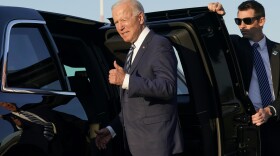-
Pfizer says it is about to seek U.S. authorization for a third dose of its COVID-19 vaccine, but U.S. health officials say a booster isn't needed yet.
-
The challenge of refrigerating COVID-19 vaccines is acute in sub-Saharan Africa, where only 28% of health care facilities have reliable power. One solution? A new kind of freezer powered by the sun.
-
On the first European trip of his presidency, Biden will announce a major U.S. contribution to the global vaccine effort — part of an effort to end COVID-19 "everywhere."
-
President Biden's commitment Monday to donate doses of Moderna, Pfizer and Johnson & Johnson vaccines adds to an earlier promise of 60 million doses of AstraZeneca.
-
Parents who have enrolled their children in these studies say the risk is worth it for the greater good.
-
Children as young as 12 can now get Pfizer's COVID-19 vaccine, but it may be hard to convince some parents to let them. NPR's Mary Louise Kelly and pediatrician Dr. Sally Goza discuss this hesitancy.
-
The FDA has approved giving the vaccine to ages 12 and older. By when and where, and what about younger kids? You have questions. We have answers.
-
Pfizer said in late March that clinical trials found "100% efficacy and robust antibody responses" to the coronavirus in 12- to 15-year-olds.
-
The agency's approval of the Pfizer-BioNTech vaccine — shown to be 95% effective — would go beyond the speedier and less rigorous emergency use authorization currently granted to the vaccine.
-
Pfizer plans to submit emergency-use authorization requests in September, with one covering children 2 to 5 years old and a second applying to ages 5 to 11.
Play Live Radio
Next Up:
0:00
0:00
Available On Air Stations










